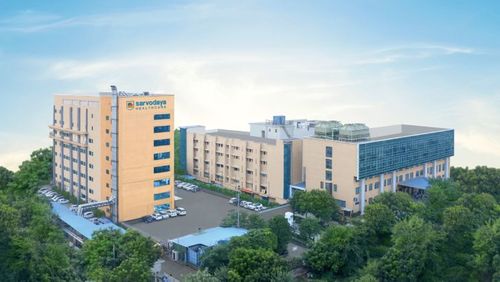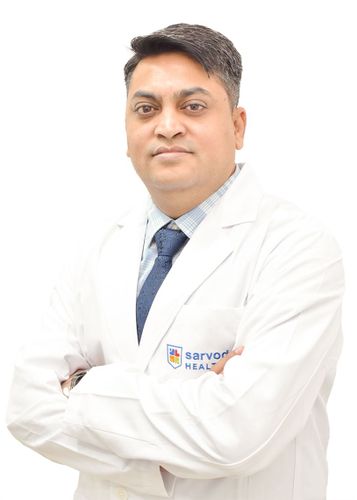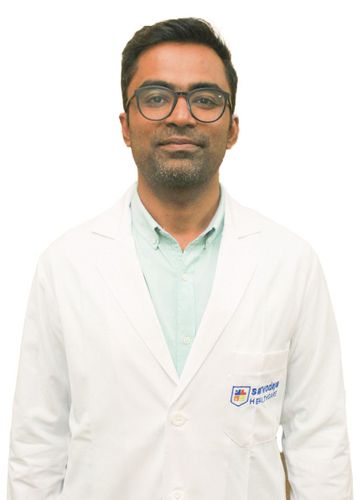Overview
Gastrointestinal (GI) Cancer includes a group of cancers that affect organs of the digestive system, such as the oesophagus, stomach, pancreas, liver, intestines, and bile ducts. These cancers often show subtle symptoms like unexplained abdominal pain, persistent bloating, difficulty swallowing, or changes in bowel habits.
At Sarvodaya Cancer Institute, patients receive comprehensive gastrointestinal cancer treatment in Faridabad through a multidisciplinary approach involving surgical, medical, and radiation oncology. A multidisciplinary team of doctors leverages high-end imaging, robotic-assisted surgeries, and precision therapies to provide safe, effective, and organ-preserving care, designed for optimal recovery and long-term outcomes.
Symptoms of Gastrointestinal Cancer
- Persistent abdominal pain or discomfort
- Unexplained weight loss
- Changes in bowel habits (diarrhoea, constipation, or blood in stool
- Difficulty swallowing or feeling full quickly
- Nausea, vomiting, or loss of appetite
- Fatigue or general weakness
- Jaundice (yellowing of skin/eyes), especially in pancreatic or liver cancers
Causes of Gastrointestinal Cancer
- Genetic mutations
- Chronic infections
- Smoking and alcohol consumption
- Obesity and a sedentary lifestyle
- Poor diet
- Inflammatory conditions
- Exposure to carcinogens
Diagnosis of Gastrointestinal Cancer
Diagnosing gastrointestinal cancer requires a combination of imaging, lab tests, and direct tissue evaluation. At Sarvodaya, we utilise advanced diagnostics to accurately identify the type, location, and stage of cancer, enabling a tailored treatment plan for every patient by a skilled gastrointestinal cancer specialist.
- Endoscopy or Colonoscopy: Enables direct visualisation of the GI tract and allows for tissue biopsy from abnormal growths.
- Imaging Tests (CT, MRI, PET): Helps assess tumour size, lymph node involvement, and distant spread (metastasis).
- Biopsy & Histopathology: Confirms the presence of cancer cells and identifies the cancer type through microscopic analysis.
- Blood Tests & Tumour Markers (CEA, CA 19-9, AFP): Aid in detection, monitoring treatment response, and checking for recurrence.
- Barium X-Rays or Contrast Studies: Highlight structural abnormalities in the oesophagus, stomach, or intestines.
- Liver Function Tests: Evaluate liver health in cases where metastasis or primary liver cancer is suspected.
Treatment for Gastrointestinal Cancer
- Team-Based Diagnosis: Our expert team uses PET-CT, endoscopic ultrasound, and molecular tests to plan precise, personalised treatments.
- Robotic GI Surgeries: We offer robotic-assisted procedures like esophagectomy, gastrectomy, and colectomy for high-precision, minimally invasive cancer removal and faster recovery.
- Medical Oncology: Stage-specific chemotherapy, immunotherapy, and targeted therapies are tailored for cancers of the stomach, colon, pancreas, and liver.
- Liver & Pancreatic Tumours: Complex cases are handled by specialised tumour boards using advanced surgical and non-surgical methods, including robotic resection.
- Recovery & Nutrition: Dedicated support for digestive health through personalised diets, GI rehab, and continuous follow-up ensures better outcomes.
Prevention & Lifestyle Modification
Adopting healthy lifestyle habits can significantly reduce the risk of gastrointestinal cancers. At Sarvodaya, we encourage proactive steps to maintain digestive health and support overall well-being with guidance from an experienced gastrointestinal doctor in Faridabad.
- Eat a fibre-rich, balanced diet with fruits, vegetables, and whole grains.
- Limit red and processed meats, fried foods, and highly refined sugars.
- Quit smoking and avoid alcohol or use it in moderation.
- Maintain a healthy weight and engage in regular physical activity.
- Manage chronic conditions like acid reflux, IBD, or pylori infections.
- Go for regular screenings (e.g., colonoscopy) after age 45 or earlier if there's a family history.
- Reduce stress and prioritise gut health through adequate sleep and hydration.
Pre–Post Surgery Modifications for Gastrointestinal Cancer
Pre-treatment:
- Focus on a nutrient-dense diet to build strength and immunity
- Stop smoking and alcohol consumption to support healing
- Stay active with light exercise, as guided by your doctor
- Get all pre-surgical evaluations and vaccinations done in time
- Discuss any medications or supplements with your oncologist
Post-treatment:
- Follow a bland, low-residue or soft diet as advised, progressing gradually
- Include small, frequent meals to ease digestion
- Maintain hydration and manage weight carefully
- Watch for digestive side effects like nausea, constipation, or diarrhoea
- Attend regular follow-ups and scans
- Seek counselling or support groups to cope emotionally








